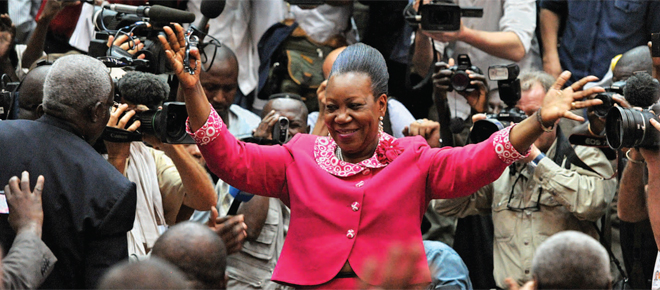Good news, bad news
The poor get richer and Vladimir Putin gets even less friendly towards homosexuality
Ssouf Sanogo / AFP / Getty Images
Share

Good news
Nuclear stand-down
Efforts to hem in Iran’s nuclear ambitions are showing early signs of success. Tehran said it has suspended the production of enriched uranium that’s close to bomb-making grade, and has disconnected centrifuges used to enrich uranium at its Natanz site. The moves were the result of an agreement Iran struck with the U.S., Russia, China, Britain, France and Germany in November. In exchange, the Western powers will relax certain sanctions. A welcome development, but one that needs close continued monitoring, given Iran’s track record on international co-operation.
Striking accord
Stephen Harper’s historic speech to Israel’s parliament this week was deemed too pro-Israel by critics back home—a missed opportunity to scold that country for peace-talk failures. Certainly, Harper might have laid out a more fulsome position on a two-state solution (as explained in a statement before his trip by the Department of Foreign Affairs). But his speech wasn’t inconsistent with Canada’s long-held Middle East views. What Harper stressed was that Canada refuses to “single out Israel for criticism,” as it so often is on the international stage, i.e., at the UN. His remarks were forthright and consistent with how one law-abiding democracy should treat another.
The poor get richer
Bill Gates is predicting an end to global poverty by 2035. By then, the former Microsoft CEO and philanthropist says, more than 70 per cent of countries will have higher per capita incomes than China (a previously poor country) does today. As evidence, Gates pointed to living standards that have already increased dramatically in Africa, Asia and South America over his lifetime, challenging the widely held belief that the world’s poor are doomed to stay that way. A poverty-free world makes us all richer.
Space race
Europe’s comet-chasing spacecraft Rosetta awoke from a 31-month hibernation this week, to the relief of its controllers in Germany. Rosetta, which has been in orbit 10 years (it was put in sleep mode for three years to conserve power), will attempt in November to land on the surface of Comet 67P/Churyumoy-Gerasimenko, as it travels at 40,000 km/h. If the mission succeeds, mankind will have landed its first spacecraft on a comet’s surface. And picked up a useful skill in the event of an Armageddon-like collision between an asteroid and Earth.
Bad News
Brotherly hate
If Russian President Vladimir Putin wants to quell Western fears about Sochi being unsafe for gay visitors, he has a strange way of showing it. In a recent TV interview, Putin not only compared gays to pedophiles, he suggested that Russia “cleanse” itself of homosexuality in order to increase the country’s birth rate. In other depressing LGBT news, Nigeria’s vehemently anti-gay government—one that makes Putin’s administration look almost quaint—just passed a law prohibiting gay marriage and gay associations in general, with the possibility of a 14-year prison sentence.
No safe haven
An audacious suicide attack on a popular restaurant in Kabul’s fortified embassy district left 21 dead last week, including two Canadians. Martin Glazer and Peter McSheffrey were accountants, in the country to audit a CIDA- funded development program. The fact that they were among the diplomats, aid workers and academics who were targeted by the Taliban speaks volumes about where Afghanistan finds itself nearly 13 years after NATO-led forces invaded. Peace and security remain but a dream. And there’s no solution on the horizon.
Job insecurity
More evidence this week that Canada’s job market is on shaky ground: Bombardier said it plans to lay off 1,100 workers in Canada in its aerospace division, which has experienced delays and falling orders for its aircraft. Twenty-five jobs were cut at Serco, a company providing services at the Air Force’s 5 Wing Base Goose Bay. And last week, Sears announced it is slashing more than 1,600 jobs in Canada. Given all that, it’s no surprise the loonie fell below US91 cents this week; faith in the economy is falling.
Old-time hockey
It took all of two seconds for a Canucks-Flames game to descend into farce last weekend. When Calgary coach Bob Hartley made the provocative decision to start his fourth-line goons, Vancouver’s bench boss John Tortorella had no choice but to respond in kind, and the fights were on. Officials handed out 178 minutes in penalties in a game the Canucks eventually won 3-2. Tortorella has been suspended for 15 days for trying to take the brawl into the Flames dressing room between periods, and Hartley has been fined $25,000. But the NHL’s punishments seem out of whack; Hartley was clearly the instigator. The real question is why the league doesn’t move to ban fighting altogether.